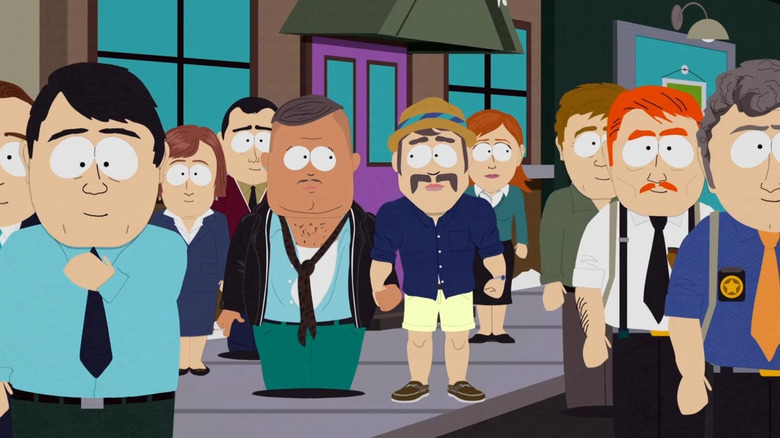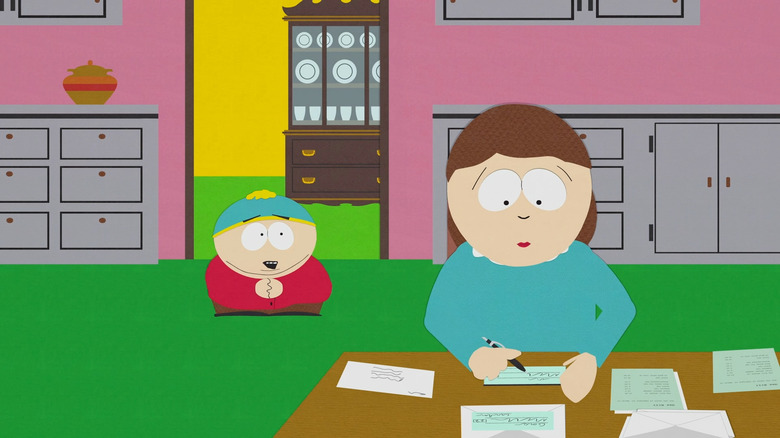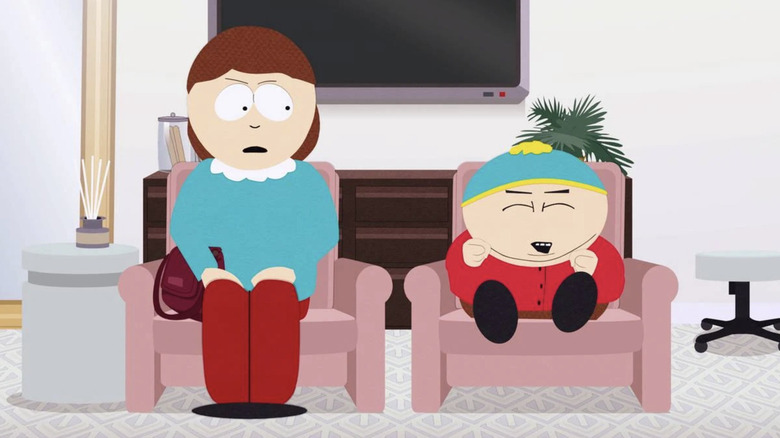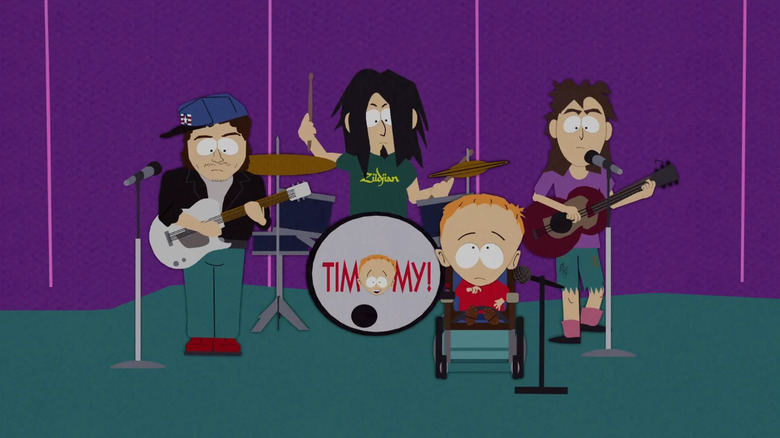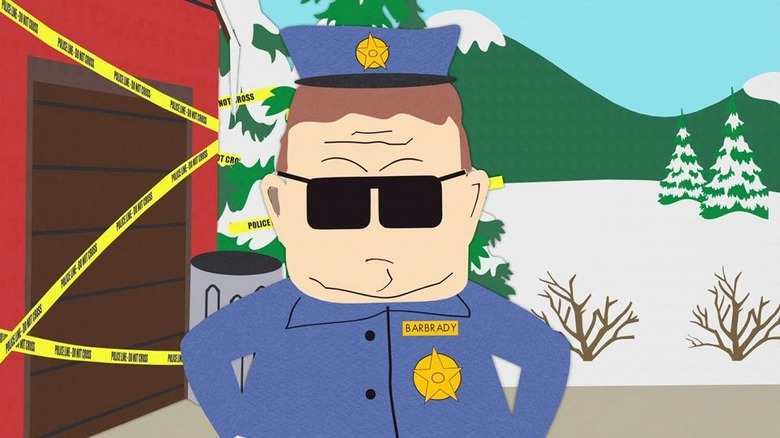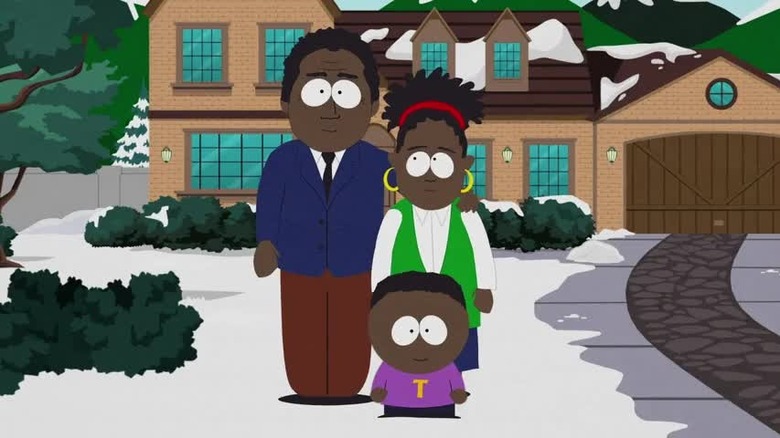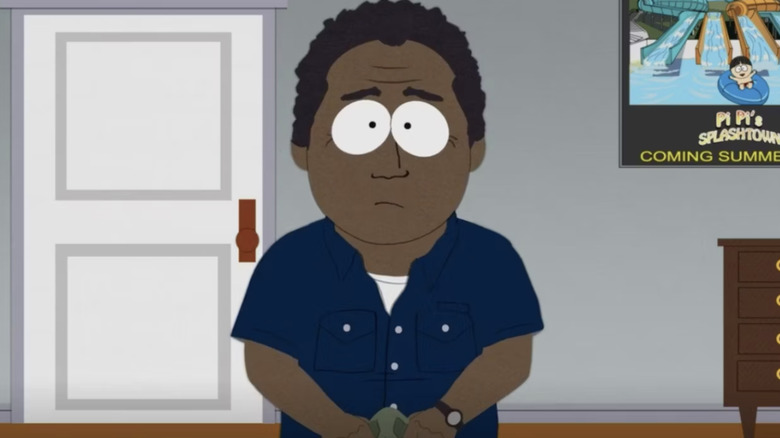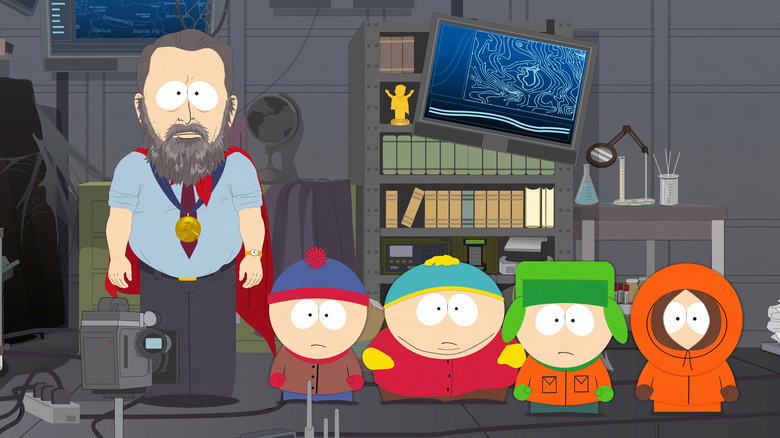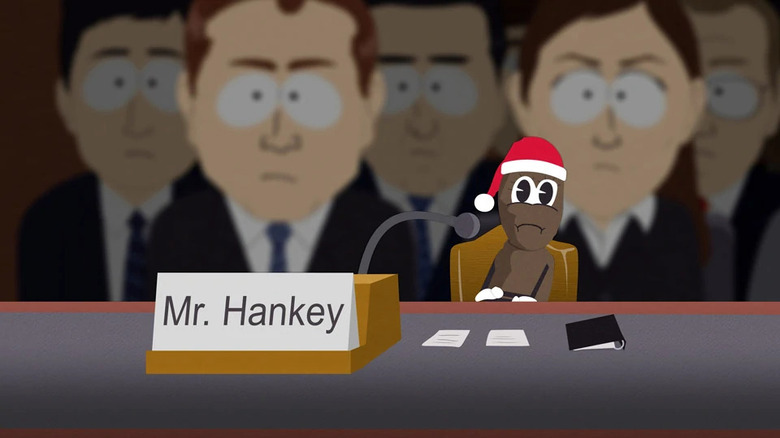The Biggest Lesson More Comedies Need To Take From South Park
Depending on who you ask, "South Park" is the edgiest or most problematic show on television. The show's legacy is heavily debated, with many finding it to be one of the last vestiges of envelope-pushing content available for mass audiences, and others believing it to be responsible for the boom of alt-right terrorists. I'm not here to proselytize anyone into worshiping at the altar of creators Trey Parker and Matt Stone, nor am I foolish enough to believe "South Park" is protected from criticism for its history of problematic content and casual bigotry. Talking about "South Park" is not a black-and-white issue, and their approach to comedy forces audiences to explore the moral gray area. Whether or not audiences actually understand the message beneath the satire is an entirely different conversation.
People often say, "I can't believe 'South Park' is still on the air," or bemoan that the show hasn't been canceled yet. But the longevity of the series, in my opinion, is proof positive that one of the biggest criticisms thrown at the show is incorrect. "South Park" can, does, and already has evolved with the changing social landscape. Revisiting all 25 seasons of the series in time for the show's anniversary was eye-opening in a multitude of ways, but one of the biggest revelations was noticing the way "South Park" actively retconned some of their own problematic history, right under our noses, without any pomp and circumstance. "South Park" is still on TV because the show is constantly evolving as it does in nature — completely undetected until compared to the origins, something more comedies could benefit from trying. Here are some of the most prominent ways "South Park" has grown over the last two-and-a-half decades.
Liane Cartman's biological sex
Liane Cartman was named after the ex-fiance of Trey Parker, who had apparently cheated on him when they were together, which is likely why the early seasons of "South Park" are so relentlessly cruel toward the character (the horse in "Cannibal! The Musical" has the same name for the same reason). Liane Cartman is presented as an immoral character deserving of mistreatment because she's posed for "Crack Whore Magazine" and appeared in German scheisse films, and she's punished for these actions by having to be the parent of the bigoted sociopath better known as Eric Cartman. Liane is noticeably one of the only single parents in "South Park," and the identity of Cartman's father was the center of the season 1 cliffhanger finale. The entire town is invested in who could be the father, because it's implied that Liane has slept with every man in town, as well as the entire Denver Broncos football team.
The season 2 episode "Cartman's Mom is Still a Dirty Sl*t" gives us the answer, revealing Eric's father to be Liane, and that she was born intersex. First of all, they don't correctly identify her as intersex, they call her a "hermaphrodite," which is an offensive term to the intersex community. The reveal also inspires most of the men in South Park to start projectile vomiting like in "The Crying Game" or "Ace Ventura: Pet Detective," playing into offensive transphobic tropes.
How did they fix it?
In the highly controversial episodes "200" and "201," "South Park" stopped treating Liane Cartman as the punchline for Cartman's parental lineage and instead correctly reframed the reveal to be an insult to the person who deserves it most: Eric Cartman. Back in season 5, Cartman orchestrated the murder of Jack and Mrs. Tenorman, the parents of Cartman's nemesis, Scott Tenorman. Once the two were killed, Cartman used the meat from their corpses for a chili recipe and managed to trick Scott into eating his own parents. This was the defining moment that solidified Cartman as being so much worse than "Archie Bunker as a child," and identified him as truly irredeemable.
In episode "201," it's revealed that Cartman's real father was Jack Tenorman, and the lie regarding Liane's biological sex was concocted to protect the reputation of the Denver Broncos, as he was playing right tackle at the time of Eric's conception. This reveal immediately pivoted the joke from "Ha ha, Cartman sucks because his mom is intersex" to "Ha ha, Cartman sucks because he killed his own father and fed him to his half-brother." Obviously the joke is bleak as hell, but it was a fantastic way to remedy one of their most unnecessarily offensive long-running jokes. As of today? Liane Cartman is currently undergoing a complete character overhaul — and finally standing up for herself.
One-joke characters have been phased out
Timmy Burch, Big Gay Al, Pip, and Officer Barbrady are some of the most memorable characters in "South Park" history, but we don't see a lot of them in recent seasons, and with good reason. Timmy was introduced in the fourth season, and according to the show's commentary track, Comedy Central didn't want him to be a part of the show at all, fearful that it would be too controversial to have a character with a mental disability. Stone and Parker fought for the inclusion of Timmy, citing that the children treat him as an equal and part of the group. The show has no desire to mock Timmy for his disability, but instead to draw attention to how uncomfortable adults are with his existence.
Big Gay Al was often used to discuss LGBTQIA+ issues, with his introductory episode "Big Gay Al's Big Gay Boat Ride" being nominated for an Emmy and a GLAAD award. In season 5, Big Gay Al has another prominent role as the South Park scout troop leader, who is fired from his job for being gay as the parents offensively equate his homosexuality with child abuse. Pip is straight-up a parody of the character from "Great Expectations," and Officer Barbrady is the stereotype of every bumbling idiot small-town cop. Despite their immeasurable contributions to the success of the show during its early years, they've all been slowly written out of the spotlight (or killed off, in the case of Pip).
Why aren't these characters used?
Timmy has essentially been replaced by Jimmy Valmer as the go-to disabled character on "South Park," often alternating with Butters and Tolkien as the unofficial "fifth member" of the core group of boys. Jimmy doesn't have the limited vocabulary Timmy does, which allows him to make statements on disability rights that are more accessible through the animated, comedy medium. Timmy does still show up from time to time, even shown walking with a cane in the "Post Covid" special. Big Gay Al and Mr. Slave are shown to be happily married, with "South Park" no longer relying on stereotypes to make commentary on LGBTQIA+ issues. Instead, Tweek and Craig fill this role. Pip was killed in episode "201" because the joke of his existence had run dry, and Officer Barbrady has been replaced by the Park County police force as a whole.
In some instances, the one-note jokes just weren't working anymore, and it was time for "South Park" to leave their stereotypical portrayals in the past. In terms of Officer Barbrady, it's clear Parker and Stone recognized their tackling of the criminal justice system required a much bigger scope and could no longer be relegated to "one bad cop." If something doesn't work anymore, it's time to let it go. As much as I will forever hold a nostalgic place in my heart for Big Gay Al, I hope he's enjoying his married life away from the show's high jinks.
The Black family is vital
For a very long time, Steve, Linda, and Tolkien Black were the only Black family in the entire town of South Park, with Tolkien's name originally introduced to parody the idea of "the token Black character" trope in entertainment to showcase diversity for the sake of diversity. Tolkien has consistently been one of the most well-adjusted kids on the show, and the Black family was introduced to defy racial stereotypes, as they're also the most wealthy and successful family in town. The longer the show has been on the air, the more prominent a role Tolkien has played in the adventures of the South Park Elementary students. That he was still using a name that was meant to be a way to minimize the importance of a character's representation wasn't in line with how the show was genuinely including him.
In season 25's best episode, "The Big Fix," Parker and Stone remedied the poor name choice in the most "South Park" way possible. Stan learns that Tolkien is named after fantasy author J.R.R. Tolkien and realizes he's been mistakenly believing him to be named "Token" for years. He panics, understanding how racist this makes him appear, and is horrified when he discovers that everyone in school knew his name was Tolkien, including Cartman, who only made "Token's Life Matters" shirts with the name spelled wrong because he's an idiot. Impressively, Parker and Stone also had all of the closed-captioning and online information (like Wikipedia, etc.) updated to reflect the change, essentially gaslighting fans as a means to acknowledging the problematic name while offering some great commentary on white fragility.
What about Steve Black?
In another move to affirm the Black family, Trey Parker relinquished his position as the voice of Tolkien's dad Steve, passing the torch to Adrien Beard, who voices Tolkien and also serves as the art director and lead storyboarder on the show. Beard originally voiced the character when he was introduced, but Parker had been voicing him for most of the other episodes. Of course, because "South Park" is "South Park," there was no way in hell Parker was going to make a big announcement regarding the role change the way shows like "Central Park" and "Big Mouth" did in 2020, nor would they outright apologize for having a white man voice the character for decades.
Instead, they included the voice change as a canonical story plot, with Steve Black leaning into his Black identity to compete as an "authentic" weed farmer against Randy Marsh, who was himself trying to tokenize Steve to add legitimacy to his own weed operation. Stephone Davis provided the voice of Steve Black in "Credigree Weed St. Patrick's Day Special" and "The Big Fix," with Beard taking over for "The Streaming Wars." All signs point to the Black family having a much bigger role as "South Park" moves into its 26th year and season, and the show will be better because of it.
ManBearPig
The closest thing we're ever going to get to Parker and Stone saying "we f***** up" is the way they have handled their contributions to climate change denial and the delegitimizing of Al Gore's "An Inconvenient Truth." First introduced in the sixth season, ManBearPig is a cryptid monster Al Gore tries to warn everyone about, but is mocked relentlessly and the seriousness of the situation is ignored in favor of B-plot nonsense. "ManBearPig" became synonymous with Gore, and the absurdity of the creature made it easy for people to disregard the real-life Al Gore's warnings. Of course, implying that Parker and Stone are somehow responsible for climate change is absolutely ridiculous (the real villain was capitalism and corporate greed all along!), but as the years went on, they knew they made a serious mistake.
In an attempt to make amends for "ManBearPig," Parker and Stone wrote "Time to Get Cereal" and "Nobody Got Cereal?" in the 22nd season, acknowledging the reality (and severity) of ManBearPig, giving Al Gore a medal for having been right all along, and even enlisted the help of Satan to try and stop the beast. The character of ManBearPig also popped up during the two-parter of "South Park: The Streaming Wars," revealed to be responsible for the issues with water supply, as well as having a wife named PigBearGirl and a child named Chuck Chuck. It's unclear whether or not ManBearPig will be a continued threat in future seasons or what PigBearGirl and Chuck Chuck are supposed to represent as climate change metaphors, but Parker and Stone's apology for ignoring climate change is a super cereal step in the right direction.
The Problem with A Poo
In 2017, a documentary was released titled "The Problem with Apu," analyzing Apu Nahasapeemapetilon's inclusion on "The Simpsons." In response, Hank Azaria announced he would no longer voice the character, and Apu was effectively written out of the show. The decision was met with conflicting reception. Some praised the action, while many Indian fans of the show expressed disappointment seeing him written off rather than given more equitable treatment.
In "The Problem with a Poo," Mr. Hankey the Christmas Poo is shown to be a problematic bigot, putting Kyle in a difficult position. He initially stands by his old friend, but Kyle gets Mr. Hankey's stink on him and ultimately decides to join the town in exiling him from their community. Kyle doesn't deliver his usual moralizing speech, knowing Mr. Hankey is no better than Roseanne Barr or Brett Kavanaugh (both parodied in this episode), who will skirt accountability until they've lost it all. The episode is complicated because "The Problem with a Poo" tries to tackle too many conflicting stories of "cancel culture," presenting the constantly crying PC Babies as both an extreme reaction as well as having been in the right the whole time. Mr. Hankey is eventually sent to a place where his behavior is still permitted, showing up in the fictional town of Springfield and being greeted by Apu.
"South Park" is well aware of its problematic past and has spent the last few seasons coming to terms with its own legacy. They're definitely still trying to find their footing in a more socially conscious culture, but the message is clear: Canonical problems call for creative, canonical solutions.
